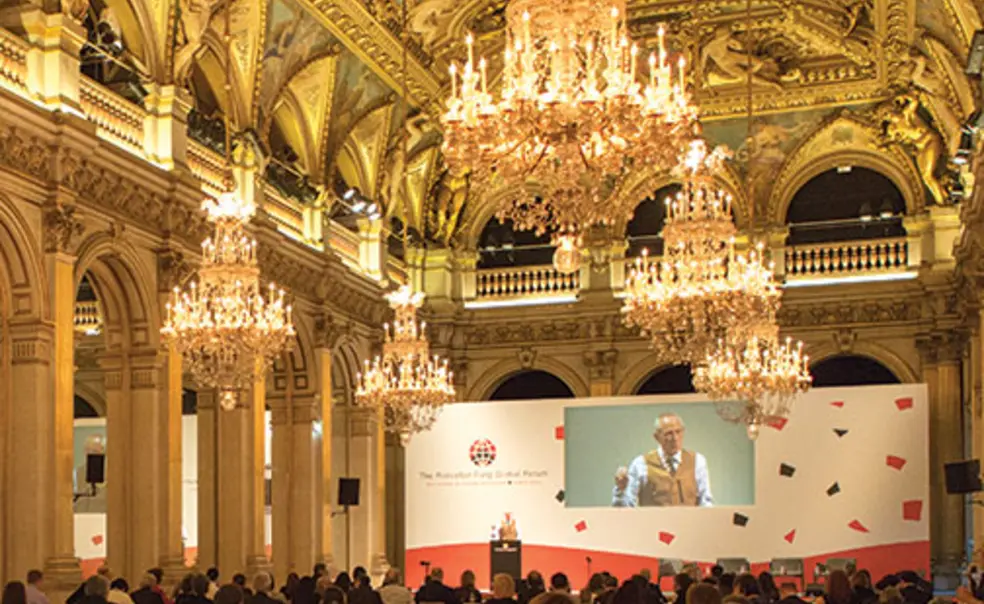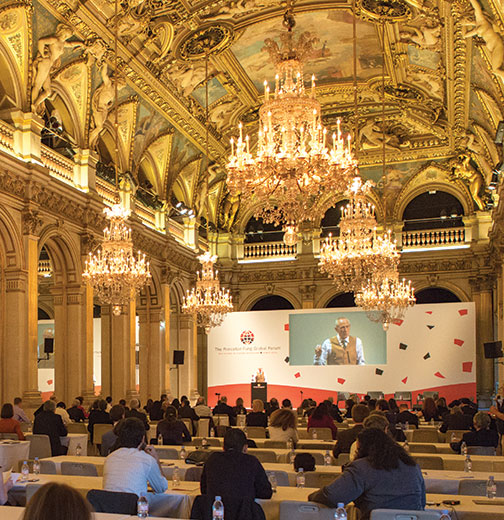The Future of Higher Ed
At the Princeton-Fung Global Forum, leaders discuss a changing environment
Sitting on a stage in a long reception hall in Paris’ ornate Hôtel de Ville, burned to the ground in 1871 by members of the Paris Commune and reconstructed as the home of city government, Princeton philosophy professor Gideon Rosen *92 had a vision of the future of higher education — and it wasn’t pretty.
Rosen and other participants in the Princeton-Fung Global Forum in April had just heard a presentation on MOOCs — massive open online courses — by Daphne Koller, the Stanford professor who co-founded Coursera, a MOOC platform that has offered 15 Princeton courses. Koller had made a strong case for the technology: Not only did it provide access to courses by top faculty for students of all ages and from around the world — one-third from nations with emerging economies — it prompted those professors to make their on-campus courses more engaging, she said.
Rosen, the chair of a Princeton faculty committee studying online learning policies, did not disagree. But in his scenario, budget-strained universities would license MOOCs instead of hiring more expensive faculty, and students would take most of their courses online, missing the experience of sitting around a seminar table and engaging with an expert in the field. (Some participants suggested that few non-elite universities offer that experience today.) Eventually, he said, there would be fewer jobs for scholars who are also teachers, and scholars would become rare. “The cost-benefit analysis may be advantageous on the whole,” he said, but “you’ve lost something you cannot recover.”
Rosen’s rebuttal to Koller provided the liveliest discussion at the three-day event, a collaboration with the Fondation Maison des Sciences de l’Homme in Paris and the second global forum funded by a $10 million gift from William Fung ’70 in 2012. More than 250 participants — academics and higher-education leaders from around the world and Princeton alumni — discussed common challenges related to their very different systems of higher education, including funding, government regulation, technology, and the need to expand access to colleges and universities.
The annual conference, along with a fellowship program also funded by Fung’s gift, aims to strengthen Princeton’s role as a thought leader in the global arena, where Fung believes the University has trailed some of its peers (see Q&A, next page). Princeton speakers included President Eisgruber ’83, Woodrow Wilson School Dean Cecilia Rouse, and Professor Alexander Nehamas *71. History professor Jeremy Adelman, director of the Council for International Teaching and Research, planned the event.
Countries where higher education is supported primarily by the public sector are struggling to meet a vastly increased demand, speakers said: In France, for example, where fees are very low, the number of undergraduates has increased tenfold since the 1960s.
The cost per student of a university education in the United States has increased by almost five times the rate of inflation since 1983, said Matthew Bishop, a panel moderator and U.S. business editor of The Economist.
Indeed, the idea of higher education’s business model was a frequent topic. Should colleges primarily serve society or the students who are their consumers? Should universities focus on instilling broad-based knowledge or skills that can lead directly to jobs?
Don Randel ’62 *67, former president of the University of Chicago, noted that what engineering students learn today will be obsolete in five to 10 years, and so the most successful will be those who learn how to educate themselves — not those who master specific skills.
Imagine a student, Randel said, who enters a store, holds up a sweatshirt, declares it a perfect fit, and buys it. But in higher education, he said, the student should hold up the shirt and say: “This is way too big!” “That’s right,” Randel would reply. “You do 100 pushups a day for four years, and it will fit you perfectly.”













No responses yet